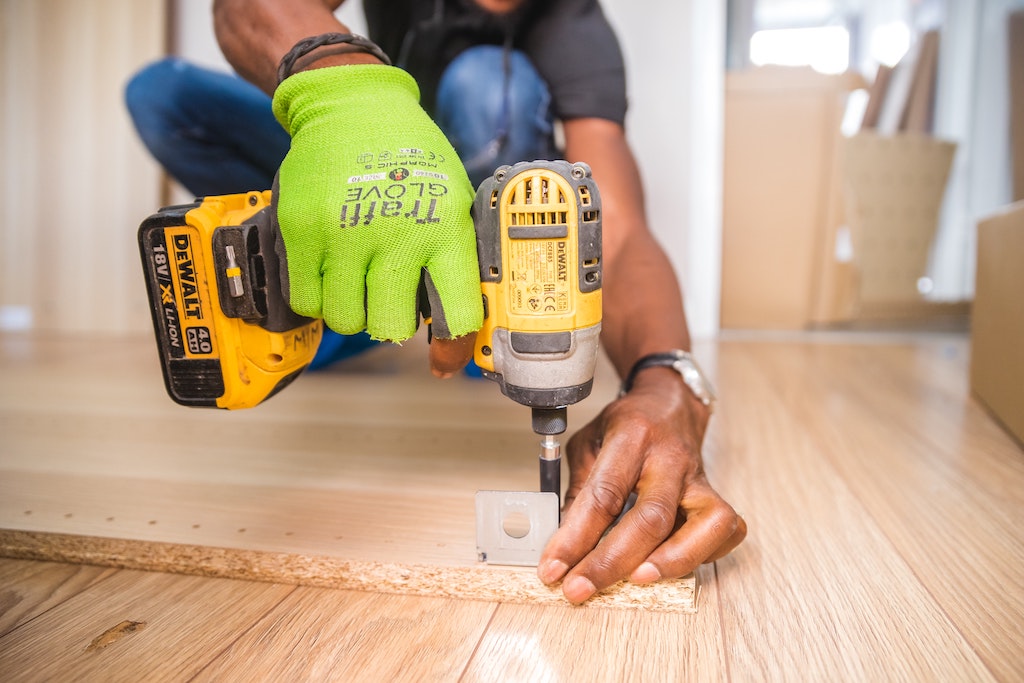When work needs to be done around the house, you’ll want to call in someone who knows what they’re doing and has the resources to do it. Read on if you’re wondering, “What is a handyman?” and “What is a general contractor?”
A handyman isn’t quite the same as a general contractor. Contractors handle large-scale projects that need special permits and licensing. A handyman may have the required skills to perform larger jobs, but it’s best to call a contractor if the job requires specialization in a specific area.
The difference between a contractor and a handyman is that a handyman can assist in odd jobs and small to medium-sized projects around the home, and a general contractor takes care of the large-scale jobs.
A handyman — or handywoman — is someone who you can have on-call for any small or midsize jobs or repairs that need to be done, especially if you’re in a pinch. A general contractor can hire specialists in a particular field if needed – like HVAC, electrical, or plumbing – or bring on a team of laborers for big jobs like stone walling. They’ll handle the hiring and contracting of these workers while you’re solely concerned with paying the general contractor for the agreed-upon work.
Handyman vs. general contractor
There are many differences between a handyman and a general contractor, but the most important thing to remember is that while a handyman can help with odd jobs and general work around the house, a general contractor is licensed and has the applicable permits to conduct the difficult work that needs to be done.
A general contractor usually hires a team to come in to help with manual labor and specialized tasks that require specific skills. Once you’ve signed a contract with the general contractor, they’ll begin the work. The contractor hires workers throughout the course of the project, managing all workers and subcontractors according to the schedule and budget. The contractor will report to you. Whatever requests or feedback you have goes directly to them, and they’ll direct the crew on how to move forward.
General contractors either own their own businesses or work for an established company. When you determine that you need a general contractor, it’s time to put out a bid. The first thing to do when you’re ready to make a bid is to add up all your expected costs, like materials and labor. You’ll also estimate when you’d like the project to be completed and determine the extent of the project you want.
Once you’ve assessed the entirety of the work you want to be done on your home, it’s a good time to research local general contractors. Look at their website and social media for reviews, and ask neighbors and friends to see if anyone can recommend a general contractor by word of mouth.
Meet with a few contractors who are willing and able to take on the job and negotiate the terms of the bid instead of making a firm bid request. Give each contractor the opportunity to discuss the project and look at the job that needs to be done. Some of them may suggest something you hadn’t thought of before.
Finally, decide on the overall budget with the general contractor you chose to hire. Work out payment installments depending on the duration of the project. Note any project milestones to move toward and establish the expected outcome for each phase so you both know what to expect. This way, they’ll have a clear mission to convey to the crew doing the specialized and manual work.
What does a handyman do?
When you want to know what type of work a handyman can do legally, the important thing to remember is that they can do basically any work that doesn’t require a license, special skills, a work permit, or a crew of other workers to get the manual labor done.
It’s a good idea to keep the number of a local handyman on hand so you can give them a call should anything arise. Whether you’re moving into a new place, thinking about remodeling, or could generally use a hand at home, you may eventually require the services of a handyman.
Here are some examples of the wide variety of tasks a handyman can do for you:
- Perform small to midsize jobs that require skilled labor
- Moderate property repairs
- Routine maintenance
- Building work
- Remodeling
- Painting
- New molding or repairing window sills
- Hang mirrors or art
- Assemble furniture or mount flat-screen televisions
- Build furnishings for your home, such as bookshelves or bench seating in the kitchen
- Paint or repair fences
- Yard and garden work
- Recommend contractors for more advanced work
Usually the tasks you call a handyman for don’t require a permit or a whole team of workers. Generally, they lend a hand around your home.
What can’t a handyman do?
A handyman shouldn’t tackle any jobs that require a permit, skilled labor they don’t have experience with, and jobs projects that need a team to cover the entirety of the work. If there’s any electrical or plumbing work, the heating and cooling system needs servicing, or if there’s a big renovation to do, it’s best not to hire a handyman.
What does a general contractor do?
While a handyman can help you out around the house, a general contractor takes on larger projects requiring specific or advanced skills and experience.
Often, the job requires special licensing and permits, and a general contractor is more likely to have these permits than a handyman. If it’s a big job, the general contractor brings in a team of workers to get the job done. He or she will be responsible for the crew and will subsequently answer to you as the homeowner.
Here are some things you would hire a general contractor for:
- Rewiring
- HVAC installation
- Major plumbing work
- Oversee building and remodeling projects from beginning to end
- Making sure a project is on schedule, is honoring the budget, and the work is done according to code
Start by getting bids from different contractors. Bids lay out your expected cost and the extent of the project, including materials, labor, and when the project should be done. If you have a local contractor in mind, feel free to work with them in negotiating the terms of a bid rather than putting out a competitive bid request. Terms typically outline payment installments, an expected timeline for milestones, and the expected outcome at each phase of the project.
What can’t a general contractor do?
A general contractor is the overseer of the job and will outsource whatever tasks are not within his or her realm of expertise. They should never take on tasks they aren’t capable of. Instead, the ideal contractor will bring on the best special laborers to get the job done under their watch.
Here are some things that very few contractors do:
- Framing
- Finishing
- Concrete
- Plumbing
- Electrical
- Landscaping
It’s very common for general contractors to outsource their work, so if any significant job needs to be done, your contractor will probably bring in reinforcements.
To know what type of work a handyman can do legally, think about handyman contracting as having someone to help with the extra work at home. Whether you’re too busy to deal with it, aren’t handy yourself, or if something happens in an emergency, an on-call handyman shows up to help you deal with the task at hand.
To understand what a general contractor is, consider them as someone who can help you deal with the complications of tackling a major renovation or a problem in the electric or heating and cooling system.
Handyman contracting is helpful for homeowners. When they can outsource the menial tasks and big jobs, they’ll have time to focus on other matters essential to running a household.




